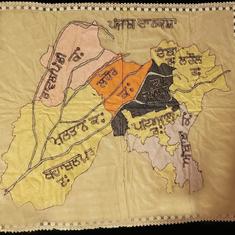Need 400 Lok Sabha seats to construct temple at Gyanvapi mosque site: Assam CM Himanta Biswa Sarma
‘We also have to ensure that no Babri Masjid is built again on the Ram Mandir site,’ the Bharatiya Janata Party leader said at an election rally in West Bengal.

Assam Chief Minister Himanta Biswa Sarma on Friday urged voters to ensure that the Bharatiya Janata Party-led National Democratic Alliance government wins at least 400 seats in the ongoing Lok Sabha elections in order to facilitate the construction of a temple at the Gyanvapi mosque complex in Varanasi.
On January 31, a Varanasi court had allowed Hindus to offer prayers in the basement of the complex after an Archaeological Survey of India report claimed that a Hindu temple that existed at the site was destroyed in the 17th century and built over.
Subsequently, the Allahabad High Court rejected a petition challenging the order.
“We want to see a temple on the Gyanvapi site,” Sarma told voters during a rally at Barrackpore in West Bengal’s North 24 Parganas district on Friday. “We have to build Krishna Janmabhoomi [the birthplace of Hindu deity Krishna].”
The Supreme Court has agreed to hear a petition by the management committee of the mosque complex challenging the Allahabad High Court’s December order on the maintainability of the lawsuits seeking the “restoration” of a Hindu temple at the disputed site.
“We also have to ensure that no Babri Masjid is built again on the Ram Mandir site,” Sarma also said on Friday.
The Ram temple in Ayodhya is built on the site of the Babri masjid, which was demolished by Hindutva extremists in December 1992 because they believed that it stood on the spot where the Hindu deity Ram was born. The incident had triggered communal riots across the country.
The Ram temple was inaugurated in a ceremony led by Modi on January 22.
Sarma added that Prime Minister Narendra Modi had been urging the electorate to ensure 400 seats in the Lok Sabha to the National Democratic Alliance as there were “many unfinished tasks” that needed to be completed in India, PTI reported. “We want to bring in the Uniform Civil Code in the country,” he said.
The uniform civil code, an ideological plank of the ruling BJP, is a proposed common set of laws governing marriage, divorce, succession and adoption for all citizens. Currently, such personal affairs of different religious and tribal groups – except in Uttarakhand and Goa – are based on community-specific laws, largely derived from religious scripture.
Sarma also said that Chief Minister Mamata Banerjee’s Trinamool Congress-led government in West Bengal would not be able to stop the implementation of the Citizenship Amendment Act in the state.
The Citizenship Amendment Act provides a fast-track to Indian citizenship for refugees from six minority religious communities, except Muslims, from Bangladesh, Afghanistan and Pakistan, on the condition that they have lived in India for six years and have entered the country by December 31, 2014. The Act was passed by Parliament in December 2019.
On March 11, the Centre notified the rules under the Act, which has been widely criticised for discriminating against Muslims. The law had sparked massive protests across the country in 2019 and 2020.
The chief minister’s statement comes days after Prime Minister Narendra Modi made similar remarks at rallies in Madhya Pradesh and Maharashtra.
On May 7, Modi had claimed that the National Democratic Alliance requires more than 400 seats in Parliament so that the Congress cannot put the “Babri lock” on the Ram temple in Ayodhya or reinstate Article 370 in Jammu and Kashmir.
Article 370 of the Constitution, which gave special status to the erstwhile state of Jammu and Kashmir, was abrogated by the Centre on August 5, 2019.
In the run-up to the Lok Sabha elections, at least three BJP leaders – Anantkumar Hegde, Jyoti Mirdha and Lallu Singh – have hinted at major changes to the Constitution if the Hindutva party gains a majority in both the Houses of Parliament.
The Opposition has alleged that the BJP is seeking an overwhelming majority in Parliament to abolish reservations in government education and jobs, and to entirely do away with democratic elections.









